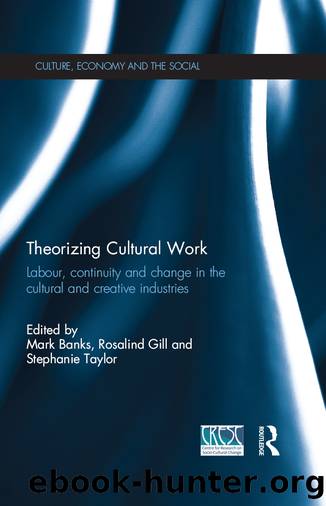Theorizing Cultural Work by Mark Banks Rosalind Gill Stephanie Taylor

Author:Mark Banks, Rosalind Gill, Stephanie Taylor [Mark Banks, Rosalind Gill, Stephanie Taylor]
Language: eng
Format: epub
Tags: Nonfiction, Social & Cultural Studies, Social Science, Sociology
ISBN: 9781134083589
Publisher: Taylor and Francis
Published: 2014-04-11T04:00:00+00:00
9 Learning from Luddites
Media labour, technology and life below the line
Richard Maxwell and Toby Miller
The central event of the 20th century is the overthrow of matter. In technology, economics, and the politics of nations, wealth â in the form of physical resources â has been losing value and significance. The powers of mind are everywhere ascendant over the brute force of things â A Magna Carta for the Information Age.
(Dyson et al. 1994)
A focus on media labour may seem odd given the dominant discourse on culture, which elevates it above monetary exchange and employment. On this account, making culture is so universal yet special, so human yet exciting, so inevitable yet pleasurable, that it transcends worldly issues of alienation or reward. Culture is inalienable and semi-sacred in both the amateur Arnoldian anthropology of the 19th century and the credulous chorine cybertarianism of today.
The supposed universality of culture is being augmented by the comparatively cheap and easy access to making and distributing meaning afforded by contemporary technologies and genres. They are thought to have eroded the one-way hold on culture that saw a small segment of the world as producers and the larger segment as audiences. The result is said to be a democratized media, higher skill levels, more sovereign consumers, and powerful challenges to old patterns of expertise and institutional authority. Traditional relationships are reversed as innovative technologies and norms of communication formalize what was always the case informally â that readers matter to authors and ultimately determine semiosis. The term âdisintermediationâ describes the impact of technologies that putatively allow us all to become simultaneously cultural consumers and producers (âprosumersâ) without the approval of gatekeepers (Banks and Humphreys 2008; Banks and Deuze 2009; Graham 2008; Ritzer and Jurgenson 2010).
This chapter steps away from such heady fantasies. Preferring the mundane world of the everyday to spectacular utopias of transcendence, we analyse life for workers âbelow the lineâ â i.e. people who are categorized underneath writers, producers, executives, directors, actors and managers in the accounting hierarchies of the bourgeois media, specifically Hollywood (the term refers to the likes of drivers, caterers, electricians, carpenters, secretaries and interns).
However, we extend the concept beyond the film industry. Doing so takes us both backwards and forwards in the life cycle of the media to include work that literally makes and unmakes media technologies as material entities: mining metals, assembling parts and disposing of detritus. The workers involved in these processes are barely visible in the double-entry bookkeeping that decides profit and loss for a major motion picture studio or mobile (cell) phone corporation. Before undertaking this project, though, we should ask why these people are absent from the discourse of the media.
The cognitariat and consciousness
Todayâs world of disorganized capitalism or post-Fordism includes a cognitariat of highly educated, occupationally insecure media producers. Classified above the line, they are voluble and newsworthy. The cognitariat was identified and named a quarter of a century ago by the lapsed-leftist Reaganite Alvin Toffler (1983), author of numerous technocentric works and signatory to the cybertarian Magna Carta of the mid-1990s cited above.
Download
This site does not store any files on its server. We only index and link to content provided by other sites. Please contact the content providers to delete copyright contents if any and email us, we'll remove relevant links or contents immediately.
Chaco's Northern Prodigies : Salmon, Aztec, and the Ascendancy of the Middle San Juan Region after AD 1100 by Paul F. Reed(378)
Digital International Relations by Unknown(373)
Law Enforcement Interpersonal Communication and Conflict Management by Brian Douglas Fitch(365)
Skilled interpersonal communication: Research, theory and practice, Fifth edition by Owen Hargie(355)
The Enduring Color Line in U.S. Athletics by Krystal Beamon Chris M. Messer(352)
Critical Perspectives on Human Security : Rethinking Emancipation and Power in International Relations by David Chandler; Nik Hynek(341)
EPSO CAST Political affairs EU policies: How to succeed in the selection procedure by Franco Reverte José María(327)
Evidence-Based Policy Making in Labor Economics by Hamermesh Daniel S.;Nottmeyer Olga K.;Nottmeyer Olga;King Sarah;King Sarah;King Sarah;(319)
Writing Public Policy - A Practical Guide to Communicating in the Policy Making Process by Catherine F. Smith(297)
Criminological Theory in Context by John Martyn Chamberlain(294)
Rothschild and Early Jewish Colonization in Palestine (Geographical Perspectives on the Human Past) by Ran Aaronsohn(291)
Positive Psychology and Spirituality in Counselling and Psychotherapy (Conflict, Ethics, and Spirituality, 12) by unknow(289)
Tibeton Yoga Its Secret Doc by Evans-Wentz(283)
Threshold Concepts in Women's and Gender Studies by Christie Launius Holly Hassel(279)
Social Problems, Social Issues, Social Science by James Wright(275)
Cognitive Development in Infancy and Childhood (Elements in Child Development) by Mary Gauvain(273)
Play in child development and psychotherapy: toward empirically supported practice by Sandra W. Russ(272)
Latin American Politics and Society by Gerardo L. Munck & Juan Pablo Luna(252)
What Makes a Social Crisis?: The Societalization of Social Problems by Jeffrey C. Alexander(233)
